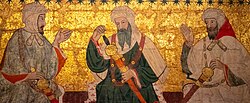| Banu Munqidh | |
|---|---|
| Emirs | |
| Country |
|
| Founded | 1025 |
| Founder | Muqallad ibn Nasr ibn Munqidh al-Kinani |
| Final ruler | Muhammad ibn Sultan |
| Dissolution | 1157 |
| Historical Arab states and dynasties |
|---|
 |
The Banu Munqidh (Arabic: بنو منقذ, romanized: Banū Munqidh), also referred to as the Munqidhites, were an Arab family that ruled an emirate in the Orontes Valley in northern Syria from the mid-11th century until the family's demise in an earthquake in 1157. The emirate was initially based in Kafartab before the Banu Munqidh took over the fortress of Shayzar in 1081 and made it their headquarters for the remainder of their rule. The capture of Shayzar was the culmination of a long, drawn-out process beginning with the Banu Munqidh's nominal assignment to the land by the Mirdasid emir of Aleppo in 1025, and accelerating with the weakened grip of Byzantine rule in northern Syria in the 1070s.
Under the reign of Emir Ali ibn Muqallad (r. 1059–1082), the Banu Munqidh reached their territorial peak with the emirate extending from the Mediterranean port of Latakia to Apamea. The Seljuk conquest of Syria in 1085 and subsequent struggles with local Muslim lords reduced the Munqidh emirate to Shayzar and its environs. Under Emir Sultan ibn Ali (r. 1098–1154), the Banu Munqidh alternated between combating the Crusaders who landed in Syria in 1099 and paying tribute to them. During this period, the family also had to contend with Ismai'li newcomers encroaching on their domains. To firmly protect the emirate, Sultan ultimately put the Banu Munqidh under Zengid suzerainty. After the death of Emir Muhammad ibn Sultan (r. 1154–1157) and his family in the 1157 earthquake, the emirate passed to the Zengid emir Nur al-Din, who granted it to the Banu al-Daya family.
Through a combination of wealth, diplomatic acumen and military skills, the Banu Munqidh survived as a local power and successfully resisted attempts by the Crusaders and stronger Syrian Muslim dynasties to seize their strategic fortress in Shayzar. Among their allies and enemies alike, the Banu Munqidh gained a reputation for "martial valor, honor, piety and courtly refinement" in the words of historian Adnan Husain. Their rural lands, which were largely populated by Greek Orthodox Christians, were distinguished for their well-kept and prosperous state. From early on, the family was also known to provide refuge for a wide array of people, ranging from Muslim refugees fleeing Crusader assaults or exiled Muslim generals, officials and other dignitaries. The best-known member of the family, Usama ibn Munqidh (1095–1188), went on to have a proficient career in literature and diplomacy, serving the courts of the Fatimids, Zengids and Artuqids. He and a number of his Munqidhite kinsmen ultimately served the Ayyubid sultans as governors, administrators or envoys in the late 12th and early 13th centuries.
